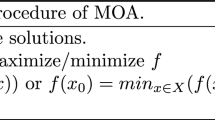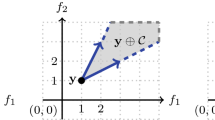Abstract
In these recent years, several metaheuristic optimization algorithms have been developed to solve complex real-world problems. However, according to the no free lunch theorem, there is no metaheuristic algorithm which has the best suited for solving all optimization problems. Therefore, developing new metaheuristic algorithms is an open problem. Two major categories of metaheuristics are swarm intelligence and evolutionary algorithms. Both of them have their own advantages. In this paper, we present a naturally swarm and evolutionary algorithm in which its particles have memory, collaboration, information sharing, and competition inherited from one specific analogy. So, it has the advantages of both swarm and evolutionary algorithms without complications of hybridizing them. We formulate a new metaheuristic optimization algorithm called open source development model algorithm (ODMA) inspired by open source development model and communities, in such a way that each potential solution is considered as a software, and by evolution of the softwares, better solutions of the function that should be optimized are searched. The main operations of the algorithm include employing features and methods of leading softwares, evolution of leading softwares based on their history and forking from leading softwares. After a detailed formulation and explanation of its implementation, the algorithm is evaluated by \(17\) well-known benchmark functions, and the results are compared with PSO, ICA, and GA. The results show that ODMA outperforms GA, PSO, and ICA in terms of finding the global optimum and convergence.
















Similar content being viewed by others
References
Ali MZ, Reynolds RG (2014) Cultural algorithms: a tabu search approach for the optimization of engineering design problems. Soft Comput. 18(8):1631–1644
Andrews DF, Mallows CL (1974) Scale mixtures of normal distributions. J R Stat Soc. Ser B (Methodol) 36(1):99–102. doi:10.2307/2984774
Angeline PJ (1998) Evolutionary optimization versus particle swarm optimization: philosophy and performance differences. In: Evolutionary Programming VII. Springer, pp 601–610
Atashpaz-Gargari E, Lucas C (2007) Imperialist competitive algorithm: an algorithm for optimization inspired by imperialistic competition. In: IEEE congress on evolutionary computation. IEEE, pp 4661–4667
Bajpai P, Singh S (2007) Fuzzy adaptive particle swarm optimization for bidding strategy in uniform price spot market. Power Syst, IEEE Trans 22(4):2152–2160. doi:10.1109/TPWRS.2007.907445
Baojiang Z, Shiyong L (2007) Ant colony optimization algorithm and its application to neuro-fuzzy controller design. Syst Eng Electron, J 18(3):603–610. doi:10.1016/S1004-4132(07)60135-2
Becerra RL, Coello CAC (2006) Cultured differential evolution for constrained optimization. Comput Methods Appl Mech Eng 195(33–36):4303–4322
Blum C, Roli A (2003) Metaheuristics in combinatorial optimization: overview and conceptual comparison. ACM Comput Surv 35(3):268–308
Deb K, Pratap A, Agarwal S, Meyarivan T (2002) A fast and elitist multiobjective genetic algorithm: nsga-ii. Trans Evol Comput 6(2):182–197
Dennis JE, More JJ (1977) Quasi-Newton methods, motivation and theory. SIAM Rev 19(1):46–89
DiBona C, Ockman S, Stone M (eds) Open sources. Voices from the open source revolution, 1st edn. O’Reilly, Sebastopol
Digalakis J, Margaritis K (2001) On benchmarking functions for genetic algorithms. Int J Comput Math 77(4):481–506
Distribution-Watch: Distrowatch. http://distrowatch.com (2014)
Dorigo M, Maniezzo V, Colorni A (1996) Ant system: optimization by a colony of cooperating agents. IEEE Trans Syst, Man, Cybern, Part B 26(1):29–41
Dorigo M, Blum C (2005) Ant colony optimization theory: a survey. Theor Comput Sci 344(2–3):243–278
dos Santos Coelho L, Souza RCT, Mariani VC (2009) Improved differential evolution approach based on cultural algorithm and diversity measure applied to solve economic load dispatch problems. Math Comput Simul 79(10):3136–3147
Eberhart R, Shi Y (2001) Particle swarm optimization: developments, applications and resources. In: Proceedings of the 2001 congress on evolutionary computation, 2001, vol 1. pp 81–86. doi:10.1109/CEC.2001.934374
Elamvazuthi I, Vasant P, Ganesan T (2013) Hybrid optimization techniques for optimization in a fuzzy environment. In: Zelinka I, Snásel V, Abraham A (eds) Handbook of optimization, intelligent systems reference library, vol 38. Springer, New York, pp 1025–1046
Ellabib I, Calamai PH, Basir OA (2007) Exchange strategies for multiple ant colony system. Inf Sci 177(5):1248–1264
Ganesan T, Vasant P, Elamvazuthi I (2013) Hybrid neuro-swarm optimization approach for design of distributed generation power systems. Neural Comput Appl 23(1):105–117
Gargari EA (2014) ICA Website http://www.icasite.info/
Gen M, Syarif A (2005) Hybrid genetic algorithm for multi-time period production/distribution planning. Comput Ind Eng 48(4):799–809
Ghosh RA, Glott R, Krieger B, Robles G (2002) Free/libre and open source software: survey and study (floss) part 4: survey of developers. Tech. rep., International Institute of Infonomics, University of Maastricht. http://www.infonomics.nl/FLOSS/report/
Gill PE, Murray W, Wright MH (1981) Practical optimization. Academic Press Inc. [Harcourt Brace Jovanovich Publishers], London.
GNU-Linux: Gnu/linux distribution timeline. http://futurist.se/gldt/ (2014)
Goldberg DE (1989) Genetic algorithms in search, optimization and machine learning, 1st edn. Addison-Wesley Longman Publishing Co., Inc., Boston
Gómez J, Gil C, Baños R, Márquez A, Montoya F, Montoya M (2013) A pareto-based multi-objective evolutionary algorithm for automatic rule generation in network intrusion detection systems. Soft Comput 17(2):255–263
Hansen N, Müller SD, Koumoutsakos P (2003) Reducing the time complexity of the derandomized evolution strategy with covariance matrix adaptation (cma-es). Evolut Comput 11(1):1–18
Hansen N, Auger A, Finck S, Ros R et al (2010) Real-parameter black-box optimization benchmarking 2010: experimental setup. Technical report (2010)
Hassan R, Cohanim BE, de Weck OL (2005) Comparison of particle swarm optimization and the genetic algorithm. In: 46th AIAA/ASME/ASCE/AHS/ASC structures, structural dynamics, and materials conference, AIAA-2005-1897. American Institute of Aeronautics and Astronautics, Austin, Texas (2005)
Haupt RL, Haupt SE (1998) Practical genetic algorithms. John Wiley & Sons Inc, New York
Hui Zhan Z, Zhang J, Li Y, Shi YH (2011) Orthogonal learning particle swarm optimization. IEEE Trans. Evol Comput 15(6), 832–847
Jiménez F, Sánchez G, Juárez JM (2014) Multi-objective evolutionary algorithms for fuzzy classification in survival prediction. Artif Intell Med 60(3):197–219
Juang CF (2004) A hybrid of genetic algorithm and particle swarm optimization for recurrent network design. Syst Man Cybern Part B 34(2):997–1006
Kao YT, Zahara E (2008) A hybrid genetic algorithm and particle swarm optimization for multimodal functions. Appl Soft Comput 8(2):849–857
Kennedy J, Eberhart RC (1995) Particle swarm optimization. In: Proceedings of the IEEE international conference on neural networks, pp 1942–1948
Kronfeld M, Planatscher H, Zell A (2010) The eva2 optimization framework. In: Blum C, Battiti R (eds) LION, Lecture notes in computer science, vol 6073. Springer, New York, pp 247–250
Liang JJ, Qu BY, Suganthan PN (2013) Problem definitions and evaluation criteria for the cec 2014 special session and competition on single objective real-parameter numerical optimization. Zhengzhou University, Technical report
Liang JJ, Qin AK, Suganthan PN, Baskar S (2006) Comprehensive learning particle swarm optimizer for global optimization of multimodal functions. IEEE Trans Evol Comput 10(3):281–295
Li X, Tang K, Omidvar MN, Yang Z, Qin K (2013) Benchmark functions for the cec’2013 special session and competition on large-scale global optimization. Gene 7:33
Liu G, Guo W, Niu Y, Chen G, Huang X (2014) A pso-based timing-driven octilinear steiner tree algorithm for vlsi routing considering bend reduction. Soft Comput 1–17. doi:10.1007/s00500-014-1329-2
Mahil J, Raja TSR (2014) An intelligent biological inspired evolutionary algorithm for the suppression of incubator interference in premature infants ecg. Soft Comput 18(3):571–578
Mendes R, Kennedy J, Neves J (2004) The fully informed particle swarm: simpler, maybe better. IEEE Trans Evol Comput 8(3):204–210
Mirjalili S, Mirjalili SM, Lewis A (2014) Grey wolf optimizer. Adv Eng Softw 69:46–61
Molga M, Smutnicki C (2005) Test functions for optimization needs. Technical report, Bioinformatics Laboratory
Muffatto: Open Source: a multidisciplinary approach, 1 edn. World Scientific Publishing (2006)
Ong YS, Lim MH, Zhu N, Wong KW (2006) Classification of adaptive memetic algorithms:a comparative study. IEEE Trans Syst Man Cybern-Part B 36(1) (2006)
Papadimitriou CH, Steiglitz K (1998) Combinatorial optimization: algorithms and complexity. Dover Publications, Mineola
Pelta DA, Krasnogor N (2009) Nature-inspired cooperative strategies for optimization. Int J Intell Syst 24(7):723–725
Puchinger J, Raidl GR (2005) Combining metaheuristics and exact algorithms in combinatorial optimization: A survey and classification. In: Mira J, Álvarez JR (eds) IWINAC (2), vol 3562. Springer, New York, pp 41–53
Rashedi E, Nezamabadi-pour H, Saryazdi S (2009) Gsa: a gravitational search algorithm. Inf Sci 179(13):2232–2248
Ratnaweera A, Halgamuge SK, Watson HC (2004) Self-organizing hierarchical particle swarm optimizer with time-varying acceleration coefficients. IEEE Trans Evol Comput 8(3):240–255
Raymond ES (1999) The cathedral and the bazaar, 1st edn. O’Reilly & Associates Inc, Sebastopol
Reynolds RG (1999) New ideas in optimization. chap. Cultural algorithms: theory and applications, McGraw-Hill Ltd., Maidenhead, pp 367–378
Robinson J, Sinton S, Rahmat-Samii Y (2002) Particle swarm, genetic algorithm, and their hybrids: optimization of a profiled corrugated horn antenna. In: Antennas and propagation society international symposium, 2002. IEEE, vol 1, pp 314–317. IEEE
Runarsson TP, Yao X (2000) Stochastic ranking for constrained evolutionary optimization. IEEE Trans Evol Comput 4(3):284–294
Schwefel HP (1995) Evolution and optimum seeking, Sixth-generation computer technology series. Wiley, New York
Settles M, Soule T (2005) Breeding swarms: a ga/pso hybrid. In: Proceedings of the 2005 conference on genetic and evolutionary computation, ACM, pp 161–168
Shi Y, Eberhart R (1999) Empirical study of particle swarm optimization. In: Proceedings of the 1999 congress on evolutionary computation, 1999. CEC 99, vol 3
Stallman R (1984) The free software definition (1984). Available at: http://www.gnu.org/philosophy/free-sw.html
Storn R, Price K (1997) Differential evolution– a simple and efficient heuristic for global optimization over continuous spaces. J. Glob Optim 11(4):341–359
Trelea IC (2003) The particle swarm optimization algorithm: convergence analysis and parameter selection. Inf Process Lett 85(6):317–325
van den Bergh F, Engelbrecht AP (2006) A study of particle swarm optimization particle trajectories. Inf Sci 176(8):937–971
Volk W (1969) Applied statistics for engineers. McGraw-Hill, New York
Williams S (2002) Free as in freedom. Richard Stallman’s crusade for free software. O’Reilly, Beijing; Cambridge; Farnham; Köln (2002)
Wolpert DH, Macready WG (1997) No free lunch theorems for optimization. Trans Evol Comp 1(1):67–82. doi:10.1109/4235.585893
Yang Z, Tang K, Yao X (2008) Large scale evolutionary optimization using cooperative coevolution. Inf Sci 178(15):2985–2999
Yao X (1993) An empirical study of genetic operators in genetic algorithms. Microprocess Microprogr 31(2):707–714
Yao X, Liu Y, Lin G (1999) Evolutionary programming made faster. IEEE Trans Evol Comput 3(2):82–102
Zhiqiang G, Huaiqing W, Quan L (2013) Financial time series forecasting using lpp and svm optimized by pso. Soft Comput 17(5):805–818
Zuo X, Xiao L (2014) A de and pso based hybrid algorithm for dynamic optimization problems. Soft Comput 18(7), 1405–1424 (2014). doi:10.1007/s00500-013-1153-0. http://dx.doi.org/10.1007/s00500-013-1153-0
Author information
Authors and Affiliations
Corresponding author
Additional information
Communicated by V. Loia.
Rights and permissions
About this article
Cite this article
Hajipour, H., Khormuji, H.B. & Rostami, H. ODMA: a novel swarm-evolutionary metaheuristic optimizer inspired by open source development model and communities. Soft Comput 20, 727–747 (2016). https://doi.org/10.1007/s00500-014-1536-x
Published:
Issue Date:
DOI: https://doi.org/10.1007/s00500-014-1536-x




